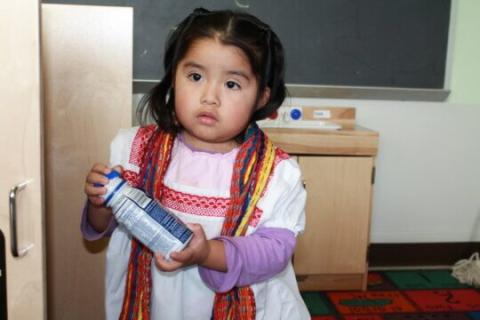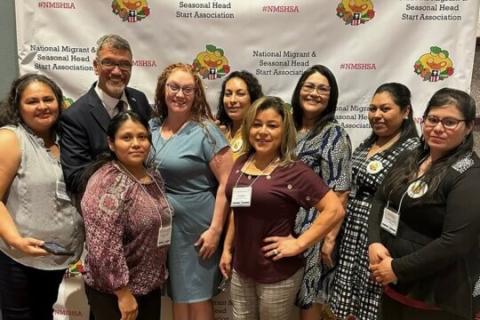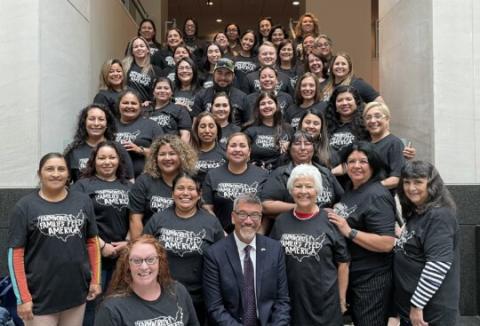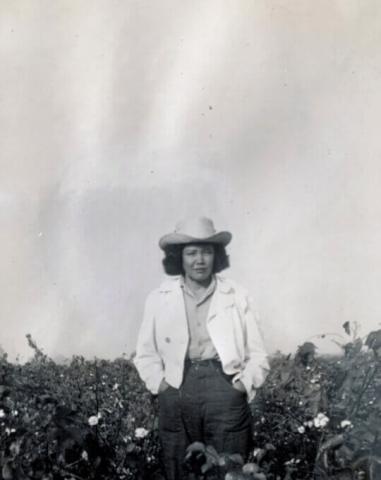How Migrant and Seasonal Head Start Finally Succeeded in Expanding Reach to Farmworker Families
Originally published in Progress Report, powered by UNIDOSUS.

“I thrive on a challenge and this was a special challenge, it involved two things I am passionate about – excellent early education programming and the children of agricultural workers –, it was the perfect opportunity to forge forward,” said Rodriguez.
UnidosUS is grateful for his contributions on both counts and wants other civil rights and education advocates to take note. That’s because Rodriguez was a lead player in a federal policy win this year that should drastically improve access to early childhood education for underserved populations, specifically the children of agricultural workers.
In late March, the Biden-Harris Administration signed into law provisions that would allow any child with at least one family member who is engaged in agricultural employment and earning over 50% of their income from that work to be eligible for a Migrant and Seasonal Head Start program, and any child from the Tribe or living with Tribal members to attend Indian Head Start.
First established in 1965, Head Start is a series of federally-funded childcare programs providing education and support to families with children ages birth to five with a focus on early learning and development, health and nutrition and family well-being. Migrant and Seasonal Head Start were launched in 1969 to ensure coverage of children ages birth to five whose families work in agriculture, and it is the only Head Start program with a work requirement. At its best, it has helped to lift hundreds of thousands of families out of poverty by allowing them to keep their jobs while raising children, and helping those children be school-ready by the time they reach the U.S. K-12 educational system.
However, over the last six years, Rodriguez started to notice that many working-class agricultural families were suddenly locked out of quality, affordable childcare due to the decisions of some states to increase the minimum wage. While Rodriguez fully supports wage hikes, he says there are unintended consequences because the low-income criteria the federal government used for Head Start eligibility has not been updated in decades.

Rodriguez, who has worked in Head Start leadership several times throughout his three-decade career, has spent his lifetime observing the challenges faced by farmworker families like the one he grew up in. His parents had left the fields by the time he was born, and it would be a few more years before the Migrant and Seasonal branch of Head Start was founded, so he didn’t have that educational structure as a young child; however, he is passionate that all eligible agricultural children have an opportunity to participate and benefit from Migrant and Seasonal Head Start.
“Although I did not have the advantage of MSHS or any other early education program, what I did have was a strong advocate in the form of my mom who grew up working the fields, dropping out in the 3rd grade to work but determined to teach herself to read and write in both English and Spanish. And she did,” recalled Rodriguez. “By the time she was a young girl, she had mastered both languages well enough to serve as an informant to her farm working parents and other families to help them strategize and organize in the face of an employer or government who did not usually reflect the best interests of the farmworkers. She was certain of one thing: she was their voice and was not afraid to speak up.”
Given this background, Rodriguez knew that a policy change of this magnitude would prove to be like climbing a mountain with several valleys and a lot of false peaks, but it’s in that up-and-down story, that other educational advocates may find catharsis, inspiration and the will to keep trudging ahead.
Don’t wait for reauthorization
“The only way we could make any changes to the Head Start Act was for Congress to either open the Act, or during a reauthorization, which has been due since about 2014,” says Rodriguez, who has served in leadership roles with Head Start off and on since the 1990s.
By 2018, he could already see that a lot of very young children were missing out on interventions that could give them a solid educational, social, linguistic and nutritional foundation for them to be school ready. Something had to change.
Unlike a Regional Head Start or Indian Head Start eligibility criteria, in the case of Migrant and Seasonal Head Start, families had to be employed and working in the field of agriculture while making less than $31,200 for a family of four (2024 Poverty Guideline). Despite wage increases, agricultural families aren’t exactly flushed with cash but they’re certainly contributing to America’s breadbasket. Both the work requirement and the economic contributions are sources of pride for Rodriguez and the entire MSHS communities. So he and his team of advocates, including educators, parents, and Migrant/Seasonal Head Start graduates, came to Capitol Hill armed with this argument:
“Our families work, and not only do they work, but they work in agriculture, and that’s contributing to the economy and to a safe and secure food source of this country,” they’d say.
Politicians were resistant to opening the Head Start Act because the political climate was so uncertain, so Rodriguez and his team decided instead to try through appropriations.
Moving a mountain through solidarity

That part was easier than anticipated.
“We go to congressional office after office, and shockingly, we find little resistance,” he said, but that didn’t mean the work would be easy, and luckily, his Migrant and Seasonal Head Start program wasn’t alone in its concerns. It turned out Tribal communities were facing similar issues with young Native children and enrollment criteria for Tribal Head Start. In their case, the families didn’t have a work requirement, but there were concerns about income guidelines that made it hard for Head Start to attract and serve Native children on reservations who could greatly benefit from Native-specific programming that includes preservation of languages on the verge of extinction.
“We partnered with them because we thought ‘this organization has friends on the Hill that we don’t have, and we have friends that they don’t have, and if we combine and leverage our efforts, we’re going to reach a bigger audience,” Rodriguez said. It was a brilliant strategy.
“We started with a vengeance, during the 117th Congress, moving forward at lightning speed,” he told ProgressReport.co, his words moving faster as he said it. It was already October 2022, and they were trying to get the ‘fix’ included in the omnibus appropriations bill “working to make sure we were checking off the boxes with all the people that we needed to check boxes with in Congress and within the Administration ,” he said.
And then, the Friday before Christmas, he and his advocacy team got a holiday surprise.
“We got a call that (the language) was in the bill,” he said, but noted that the language would only be good for a year, and then it would have to be reinserted— year after year, after year.
“We were just like, we’re okay with this. They said the bill’s going to hit the middle of the night on Monday morning, so I get up to start looking for the bill. I find the bill and start looking for our language…” Rodriguez paused.
“It’s not in there,” he continued. “I’m thinking, okay, it’s somewhere else or maybe I’m looking at the wrong bill.
Long story short, hours later, Rodriguez got a call from the Speaker’s office that while the language was in there, nobody in leadership was alerted so they removed it because they did not understand the context or origin of the fix.
“You’re killing me. Oh my gosh. You’re killing me,” he remembers saying.
After a few more calls to staffers on the Senate HELP Committee and a last ditch effort, it was clear that it was too late and the fix was not going to happen.
“It just died, and we were done,” he said. “Our holiday gift was not meant to be.”
If at first you don’t succeed…

“But then we thought, okay, we’ll lick our wounds and pull our bootstraps back up and do this again.”
Next, Rodriguez and his team tried speaking to the White House, hoping that it could go into the President’s FY 2025 budget so that he could demonstrate the Administration’s support as a ‘no cost’ item which would help with the House and Senate.
“They’re 100% behind us, you know, just kind of letting us do our advocacy work, but doing what they could do at their level to make it happen. So the president drops his budget that spring, and lo and behold, there’s language in there,” said Rodriguez noting that it said to remove the income-eligibility criteria for Migrant and Seasonal Head Start and improve access for Native American children.
“We thought wow, that’s a win for us,” he said.
But wait, not so fast, here come the versions from Congress. The Senate Appropriations Committee approved a bill with language that included the eligibility ‘fix’ for both Migrant and Tribal Head Start programs, but the House Appropriations Committee only added language for Tribal Head Start to their FY 2024 bill.
“Man, we go crazy. We take our parents up there, we take our directors, our alumni,” he said, adding that at the 11th hour, some politicians said they were supportive of helping agricultural workers, but felt uncomfortable signing in support of anything with the word migrants. “Despite this caution, all members of Congress we contacted understood our movement, appreciated the work of our families, and were very supportive.”
Ultimately, Migrant and Seasonal Head Start got what they wanted from the government, and the final appropriations bill agreed to by both the House and Senate and signed into law by the President included the eligibility fixes for both Migrant and Tribal Head Start programs. The new criteria simply says that as long as one member of the family works in agriculture, the children of that family are eligible for the program. The income, which Rodriguez hardly expects to reach six digits in most cases, is not a factor. The new legislation also allows the Head Start programs to prioritize farmworker families that are migrant over those who are local and seasonal, since migration poses a bigger interruption to a child’s education and development.
“These policy changes will better target Head Start services to children in Tribal communities and children of farmworkers,” said Principal Deputy Assistant Secretary, performing the delegable duties of the Assistant Secretary of the Administration for Children and Families (ACF), Jeff Hild said in a statement. “ACF is committed to ensuring that children of Tribal Nations, Native communities and migrant and seasonal workers, including farmworkers, obtain the early education and comprehensive services offered in Head Start.”
“It really gave a huge opening for many families,” Rodriguez said. “It just makes so much sense and will provide opportunities for our programs to serve additional children and families that had been previously denied eligibility.”
The next mountains to climb
In the weeks since this big policy win, Rodriguez has been going through his late mother’s belongings and thinking about the strong-willed example she gave him. One reminder came in the form of a 75-cent voting poll tax receipt he found from 1947, when his mother was just 18. He considered it a gem and a reminder.

‘I thought ‘you go mom,” he said, noting that while it was unfair to make people pay to vote, it proved how willing she was to fight for her community. It proved how she valued having her voice heard. And Rodriguez can recall both his parents voting in every election since. And while he knows there are still plenty of practices that keep migrant and seasonal farmworker families from fully excelling, he’s proud of how he and his team have moved the needle, and the way it’s changing the tone on Capitol Hill. “I am very proud of our work and our team. I am proud of our families who understand the value of their voice and the right to exercise it. I am proud of our alumni who appreciate the investment the federal government made in their school readiness and are willing to voice that appreciation.”
With the new criteria in place, Rodriguez and his team are working to ensure that programs feel comfortable with the new enrollment system since some program administrators are afraid they’ll misinterpret these guidelines. They’re also looking at how to hire a qualified workforce to ensure they can provide for the larger enrollment and opening classrooms to support families.
But overall, there’s a great feeling of celebration and the always pending question, what’s the next mountain to move?
“What we help them to understand is our hashtags: #advocacyworks, #nevergiveup. #farmworkerfamiliesfeedamerica. We could have easily just said, ‘forget it, we’ll just wait around for reauthorization,’ but that was not an option for us. NO was never the answer. We knew there was a YES, we were determined to find it. We never gave up and made it work,” said Rodriguez.
